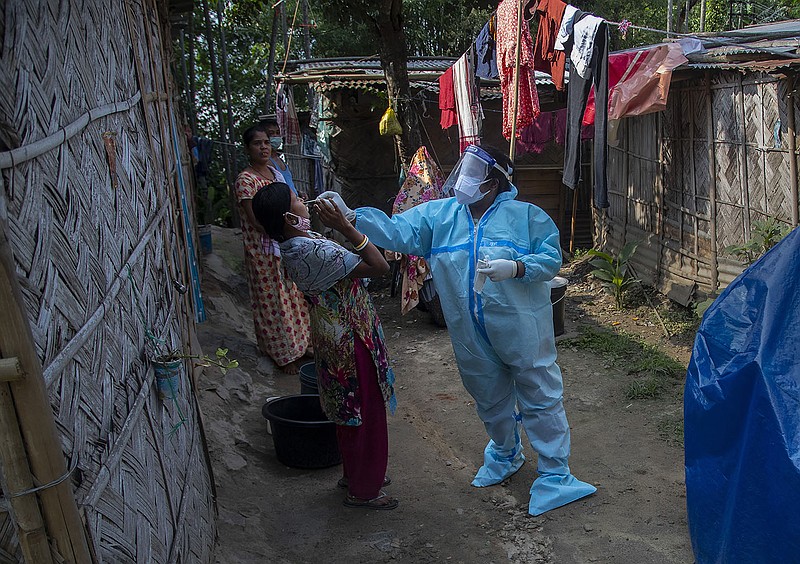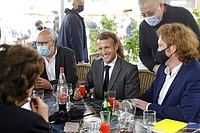GENEVA -- Deaths from covid-19 and related causes are likely to be two to three times the number that countries have recorded in their official data, the World Health Organization said Friday.
Some 6 million to 8 million people may have died from covid-19 or its effects since the start of the pandemic, compared with 3.4 million deaths recorded in countries' official reporting, Dr. Samira Asma, assistant director of the WHO's data division, told reporters.
The agency also estimates that at least 3 million people may have died from covid-19 in 2020, compared with 1.8 million recorded in official data, it reported in annual statistics released Friday.
The WHO based its assessment on a statistical model that estimates the excess deaths attributable to covid-19. The technique involves taking the total number of officially recorded deaths and then subtracting the number of deaths that would have been expected on the basis of mortality trends if the pandemic had not occurred.
[CORONAVIRUS: Click here for our complete coverage » arkansasonline.com/coronavirus]
On that basis, the WHO said it estimated that 1.1 million to 1.3 million people in 53 European countries died from covid-19 in 2020, roughly double the number recorded in official data.
The organization also calculates that, over the same period, 1.3 million to 1.5 million people died in 35 countries in the Americas, compared with the 900,000 deaths officially recorded.
The huge discrepancy between the WHO's estimates and official data underscores the limited capacity of many countries to test their populations for the coronavirus and other weaknesses in official health data. For example, some covid victims died before being tested and their deaths did not appear in official reporting, said William Msemburi, a WHO data analyst.
The WHO will present its statistics to the annual meeting of its policymaking assembly in Geneva next week. The numbers will help make the case for countries to invest urgently in bolstering data systems and their capacity to monitor and report health developments.
[Video not showing up above? Click here to watch » https://www.youtube.com/watch?v=gJvbb5jYuM4]
"We can only be better prepared with better data," Asma said.
VACCINE GRIDLOCK
With pandemic inequities deepening, the leaders of rich nations Friday called the divide in vaccine access unacceptable, shameful, even immoral, but offered few new commitments that would close the gap in an immediate way.
Instead, at a virtual summit attended by the U.S. in which some statements were prerecorded, leaders took turns offering sometimes-conflicting ideas for expanding vaccine access, and countries announced a drip-drip of largely unilateral and not entirely new moves.
Italy and Germany said they would donate doses to lower-income countries, adding to previous promises from France, New Zealand, the United States and a handful of other countries.
The European Union said that it would expand its vaccine diplomacy, helping Africa build new manufacturing hubs.
EU leaders also promoted their role in encouraging vaccine-makers to increase supply to lower-income countries at reduced prices.
Johnson & Johnson on Friday announced 200 million doses for Covax, a struggling WHO-backed initiative to distribute vaccines. Pfizer pledged 2 billion doses for lower-income countries over the next 18 months, though a spokesman told The Washington Post that the portion for this year was not a new allocation. And while EU leaders mentioned 100 million doses from Moderna, the U.S. company did not release a statement about any new deals.
"We welcome the generous announcements made today; in the coming weeks and months, we will need hundreds of millions more doses," said the World Health Organization's general-director, Tedros Adhanom Ghebreyesus. "We need companies to help make donations happen fast, and to give Covax the first right of refusal on all uncommitted doses now, in 2021."
[Gallery not loading above? Click here for more photos » arkansasonline.com/522covid/]
The summit, one of the most notable global gatherings to date to address the pandemic, takes place at a time when the fortunes of rich countries are diverging dramatically from those of the rest of the world. While the United States, Europe and a handful of other developed nations have curbed the virus with well-funded vaccination campaigns, some poorer countries -- without an adequate supply of doses -- are being ravaged like never before.
That has led to an increasingly pitched debate about how to contend with the inequities stemming from the initial push by wealthy countries to cut deals directly with vaccine-makers, gaining overwhelming control of the global supply.
Of the roughly 1.5 billion coronavirus vaccine doses administered worldwide, only 0.3% of the inoculations have taken place in low-income countries.
POINTS OF CONTENTION
The meeting Friday, co-hosted by Italy and the European Union, showed there are points of agreement for how to help poorer nations catch up, including the sharing of surplus doses, when available, and funding for improved, across-the-world vaccine manufacturing.
But countries remain at odds over other points.
The Biden administration earlier this month said that it supported waiving intellectual-property protections for coronavirus vaccines -- a notion that would allow developing countries to potentially produce generic versions. But leaders in Europe, where some of the world's biggest pharmaceutical companies are based, have objected that would not be a quick fix and could stifle innovation. The summit's final declaration specified only voluntary technology transfers.
Numerous leaders Friday emphasized instead the need to ensure the free flow of vaccine materials across borders; public-health experts and some foreign governments have accused the U.S. of prioritizing domestic orders and hindering the global supply chain.
The declaration released after the summit cited the importance of a "reliable global supply chain" during health emergencies.
Italian Prime Minister Mario Draghi, in a news conference afterward, noted that it should be easier for the United States to remove export hurdles now that it has such wide availability of shots and a large percentage of its population has been inoculated.
The challenge, he said, would come during the next emergency -- "the next surprise," he said.
"So we should use this time," Draghi said, "to make sure that somehow countries bind themselves, not only on this occasion, but also in the future."
At a summit to secure pandemic pledges last May, the United States was notably absent. This time, it was in the mix, represented by Vice President Kamala Harris. She touted previous promises while also talking about the need for a "U.N. facilitator for high-consequence biological threats."
Even nations that have tamed the virus have an incentive to help others, leaders noted Friday. Scientists warn that countries with major outbreaks can become breeding grounds for new variants, including ones that might resist current vaccines.
"Not only are these disparities unacceptable, they are also a threat," Draghi said. "So long as the virus continues to circulate freely across the world, it can mutate dangerously and undermine even the most successful vaccination campaign."
Covax, which has been struggling with a funding shortage, was dealt a further blow when India -- counted on to be the foremost manufacturer and exporter of Covax doses -- decided to limit exports while it tried to contain its enormous domestic outbreak.
The summit overall provided "too little, without the needed urgency of action," said Krishna Udayakumar, founding director of the Duke Global Health Innovation Center, in an email. "Commitments should be brought forward to enable sharing and delivery of doses in days to weeks, not months to years," he said.
Jenny Ottenhoff, senior policy director at the Washington-based ONE Campaign, which advocates for the end of preventable disease and extreme poverty, said the summit led to some "important new commitments," but it was just a start -- and after more than a year into this pandemic, "a good start is not enough."
"We have the tools to end the pandemic in months rather than years, but there is still a massive gap between commitments made and what is really needed to get these tools everywhere," Ottenhoff said.
JAPAN EMERGENCY
Japan on Friday expanded a coronavirus state of emergency hours after it approved the use of two more vaccines in an effort to contain a worrying surge in infections nine weeks ahead of the planned opening of the Tokyo Olympics.
Although there's no forced lockdown, the state of emergency allows prefectural governors to demand that shops and public establishments close or shorten their hours. It has expanded from the hot spots of Osaka and Tokyo in late April to other regions earlier this month, currently covering 42% of Japan's population.
On Friday, the government announced a decision to add Okinawa, a southern archipelago that hosts most of the U.S. military forces stationed in Japan, starting Sunday.
Also Friday, Japan approved the production and use of the Moderna and AstraZeneca vaccines. Health Minister Norihisa Tamura said the two vaccines will help speed up inoculations.
Japan has administered one or more vaccine doses to roughly 5 million people, or just 4% of its population, using the Pfizer shots that were approved in February.
A quicker vaccine rollout is seen as key to Japan's ability to contain a worsening spread of the coronavirus. More than half of Japan's roughly 12,000 covid-19 deaths have happened since February. The number of patients in serious condition hit a record high this week.
As the government pushes to host the Olympics in July, virus containment is essential to warding off mounting public worry about the safety of the event. Recent polls have found that more than 80% of Japanese oppose hosting the Summer Games.
Prime Minister Yoshihide Suga has pledged to finish vaccinating the country's roughly 36 million elderly people by the end of July. However, a government survey of 1,741 municipalities released last week found that around 15% will not be able to meet the deadline.
After vaccine rollouts in cities and towns across the country, the government on Monday will open mass-vaccination sites in two of the country's biggest metropolitan areas, Tokyo and Osaka, with the goal of administering Moderna shots to as many as 15,000 elderly people a day.
AstraZeneca's vaccine will not be distributed to public vaccination sites anytime soon, the health ministry said upon approval. Because of reports of rare blood clots, the regulatory body will continue to examine the risks and usage guidelines.
Information for this article was contributed by Nick Cumming-Bruce of The New York Times; by Chico Harlan and Emily Rauhala of The Washington Post; and by Kantaro Komiya of The Associated Press.


